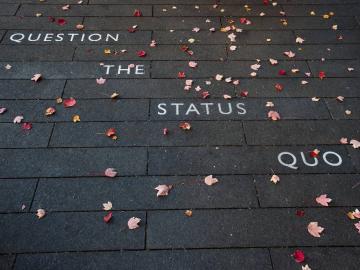"We thrive at the epicenter of innovation. We make progress by speaking our minds even when it challenges convention. We lead by championing bold ideas and taking intelligent risks."
In 2010, when Rich Lyons, then Dean of the Haas School of Business, launched an initiative that would codify the Berkeley Haas ethos through a unique set of Defining Leadership Principles—Question the Status Quo naturally emerged as it had always been an "essential element" of the culture and a quality that leaders of the future will need to embrace to be successful in the coming decades.
As a value, Question the Status Quo is one of the most powerful tools we have to improve our world and is at the heart of the Changemaker ethos. It allows us to explore different perspectives, weigh different opinions, and let common goals and truths (rather than our assumptions or fears) guide us toward a better future.
The most successful leaders and innovators throughout history have approached problems by asking powerful, unpopular, or even dangerous questions—instead of searching for easy answers—this is the foundation of critical thinking. So too, is the understanding that today's innovations will become tomorrow's status quo. With gratitude for the lessons of the past and respect for the ever-changing nature of our world, we can thoughtfully and intelligently move toward uncharted territory.
The Question the Status Quo Mindset
Our ability to effectively Question the Status Quo relies on a few essential, trainable qualities. Individuals with these three characteristics tend to excel at recognizing the vital elements of a current situation, exploring multiple perspectives, and taking the necessary actions to affect change.
Observant
Being observant doesn't come naturally to everyone. Those who are more innately observant than others tend to spot problems more easily, recognize outdated habits, and quickly identify when particular strategies are no longer working. They can also acquire helpful information and apply in new ways—in their relationships, careers, and businesses.
Agile-Minded
Agile-mindedness means being capable of approaching situations with a blank slate, remaining open to all possibilities, and entertaining diverse viewpoints and thinking processes. This quality allows us to recognize opportunities that may not be immediately apparent and are essential for creativity and bringing new solutions to old problems. It also helps our brains process information and remain flexible as we age.
Courageous
Courage is a quality that provides us with inner strength, allowing us to perform the often-uncomfortable tasks necessary to make change happen—for ourselves or others. It empowers us to ask hard questions, engage in difficult conversations, and seek the truth—no matter how inconvenient.
Question the Status Quo: Main Activities
Questioning the Status Quo is not a formulaic process—it doesn't look the same for everyone. So much depends on your environment, experiences, and a myriad of other factors. That said, the general framework below may help increase the effectiveness of intention to make change happen, especially in a personal or business context.
Identify an Opportunity or Need
Is something not working, or might it soon become an issue if not changed? Is there an opportunity to make something better?
Ask Questions
To better understand the issue, it's crucial to do your research and ask questions to get at the heart of the matter, understand the context, and challenge assumptions.
Create a Change Statement
Once you know more about the situation, a clear, straightforward 'change statement' (identifying what you want to change) will help you remain focused.
Explore Ideas and Weigh Options
Next, come up with ideas to address the issue. It might help first to ask, "How might we…" (insert the actionable part of the change statement).
Gather Allies
Partner with others who can contribute to and support this change.
Propose Change
Clarify your pitch, prototype your solution (if possible), and communicate it to your team and stakeholders.
Implement Change
Implementing change might be a simple feat or lengthy and involved, depending on the chosen solution and degree of change.
The Question the Status Quo Playbook
Questioning the Status Quo is a critical quality to cultivate and sustain for those serious about making meaningful change in the world or in their organization. Download our Question the Status Quo Playbook to get more information about this powerful principle and access tools and resources to help build the qualities it takes to effectively drive change.
Dive Deeper
Take a deep-dive into this topic and gain expert, working knowledge by joining us for the programs that inspired it!
The Berkeley Changemaker Program
Learn the importance of visionary leadership, how to find sources of purpose, and how both impact your ability to effectively lead change.
Learn moreAI for Executives Program
Leverage AI's transformative power and acquire the strategic frameworks your company needs to thrive in a radically changing environment.
Learn moreProduct Management Program
Harness AI to understand your customer’s needs, facilitate design of products & experiences, and boost your team’s performance.
Learn more


